Ethics in the Digital Age: Examining Data Ownership and Privacy
VerifiedAdded on 2023/04/24
|7
|1812
|345
Essay
AI Summary
This essay critically evaluates the ethical issues surrounding data ownership and privacy in the context of free online services, drawing upon Irina Raicu's article 'Do You Own Your Data?'. It analyzes the use of personal data as a commodity by internet companies, likening it to organ donation due to the personal nature of the information. The essay applies four ethical theories—utilitarianism, deontology, virtue ethics, and contract theory—to assess the ethical implications of these practices, referencing examples like the Cambridge Analytica scandal and Google's GDPR fine. It argues that current practices often prioritize corporate profit over user privacy, violating ethical duties and principles. The essay concludes by advocating for stricter government regulations, global policies, and corporate social responsibility to protect user data and ensure ethical business operations, highlighting the need for increased transparency and user awareness.
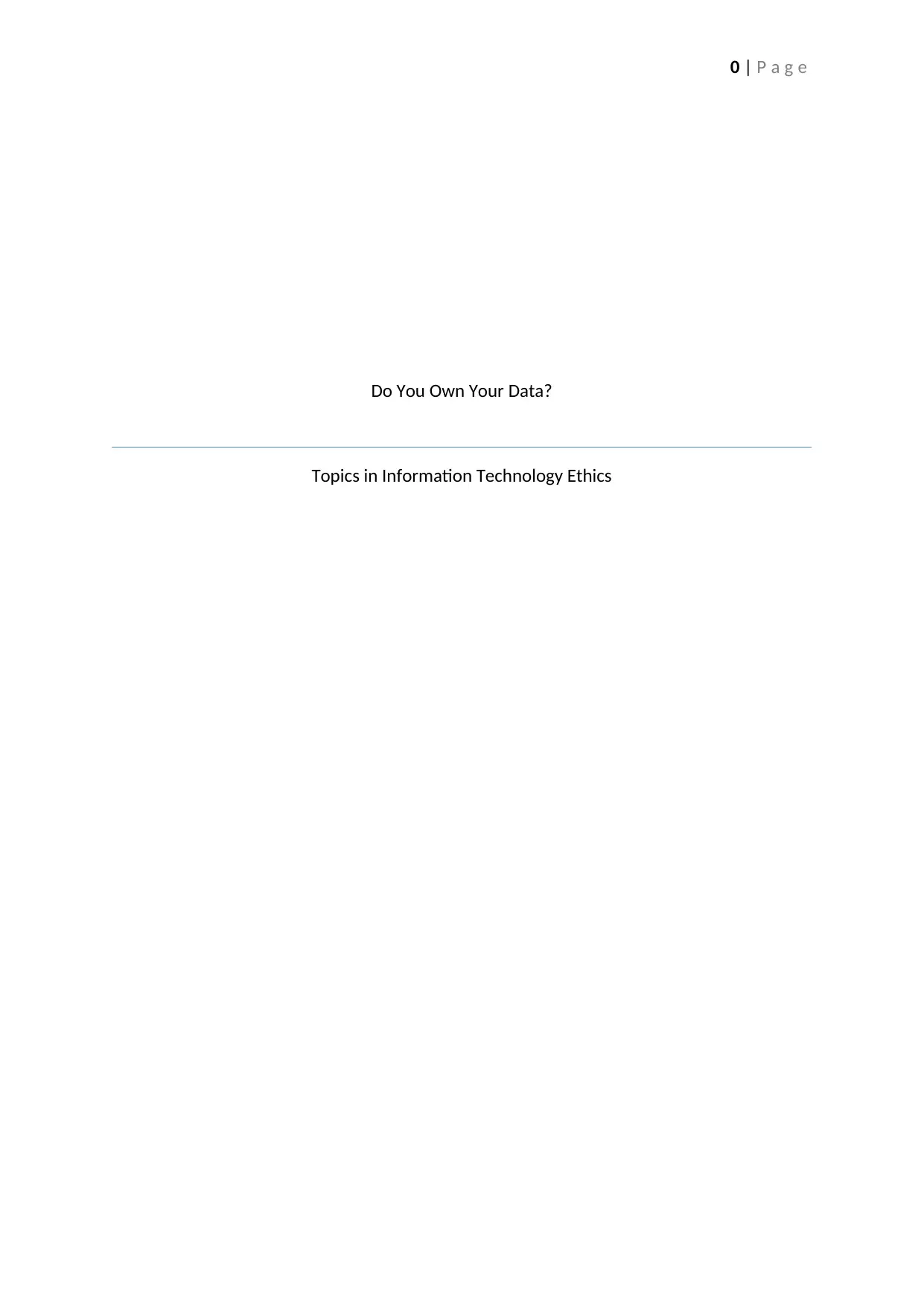
0 | P a g e
Do You Own Your Data?
Topics in Information Technology Ethics
Do You Own Your Data?
Topics in Information Technology Ethics
Paraphrase This Document
Need a fresh take? Get an instant paraphrase of this document with our AI Paraphraser
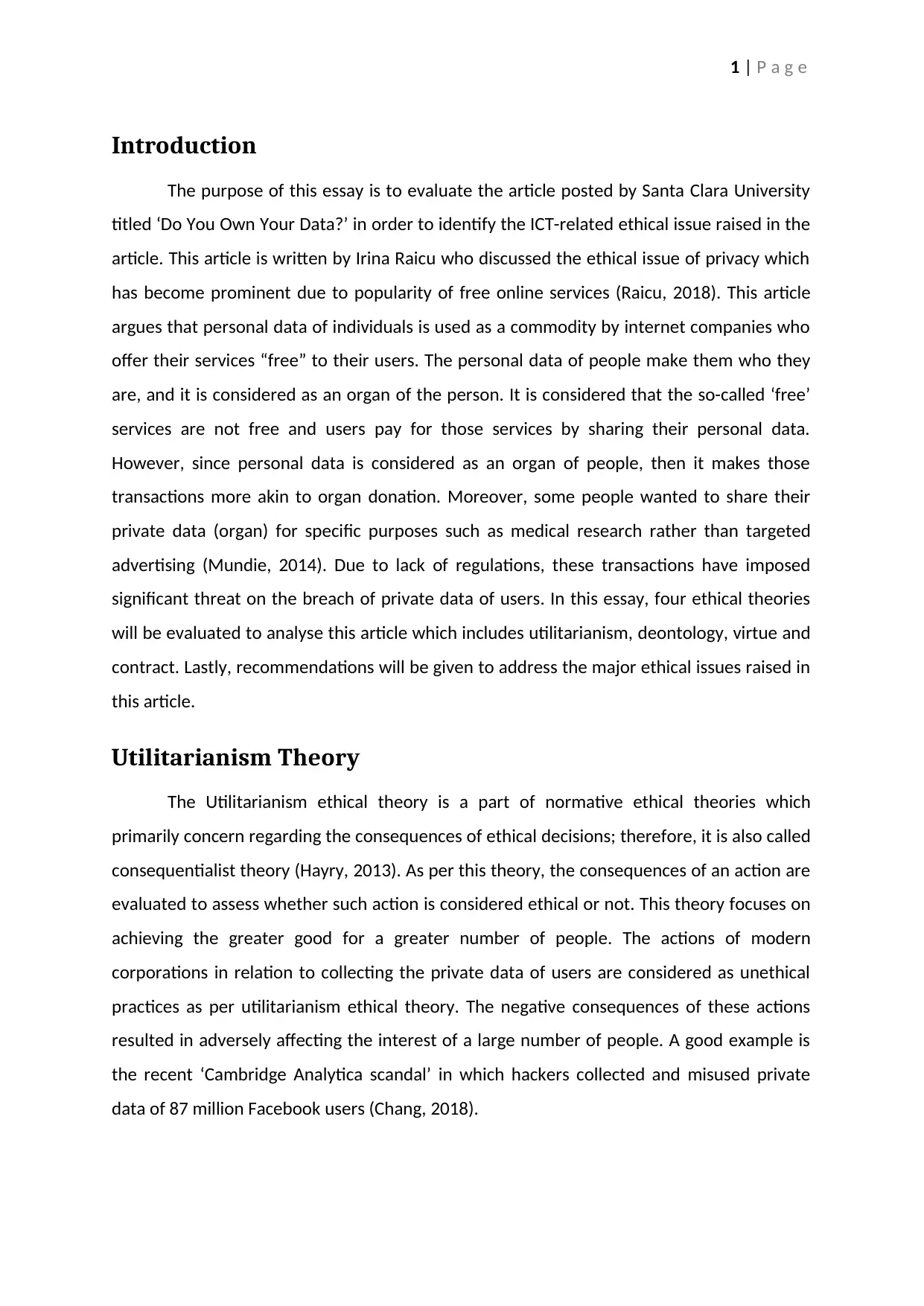
1 | P a g e
Introduction
The purpose of this essay is to evaluate the article posted by Santa Clara University
titled ‘Do You Own Your Data?’ in order to identify the ICT-related ethical issue raised in the
article. This article is written by Irina Raicu who discussed the ethical issue of privacy which
has become prominent due to popularity of free online services (Raicu, 2018). This article
argues that personal data of individuals is used as a commodity by internet companies who
offer their services “free” to their users. The personal data of people make them who they
are, and it is considered as an organ of the person. It is considered that the so-called ‘free’
services are not free and users pay for those services by sharing their personal data.
However, since personal data is considered as an organ of people, then it makes those
transactions more akin to organ donation. Moreover, some people wanted to share their
private data (organ) for specific purposes such as medical research rather than targeted
advertising (Mundie, 2014). Due to lack of regulations, these transactions have imposed
significant threat on the breach of private data of users. In this essay, four ethical theories
will be evaluated to analyse this article which includes utilitarianism, deontology, virtue and
contract. Lastly, recommendations will be given to address the major ethical issues raised in
this article.
Utilitarianism Theory
The Utilitarianism ethical theory is a part of normative ethical theories which
primarily concern regarding the consequences of ethical decisions; therefore, it is also called
consequentialist theory (Hayry, 2013). As per this theory, the consequences of an action are
evaluated to assess whether such action is considered ethical or not. This theory focuses on
achieving the greater good for a greater number of people. The actions of modern
corporations in relation to collecting the private data of users are considered as unethical
practices as per utilitarianism ethical theory. The negative consequences of these actions
resulted in adversely affecting the interest of a large number of people. A good example is
the recent ‘Cambridge Analytica scandal’ in which hackers collected and misused private
data of 87 million Facebook users (Chang, 2018).
Introduction
The purpose of this essay is to evaluate the article posted by Santa Clara University
titled ‘Do You Own Your Data?’ in order to identify the ICT-related ethical issue raised in the
article. This article is written by Irina Raicu who discussed the ethical issue of privacy which
has become prominent due to popularity of free online services (Raicu, 2018). This article
argues that personal data of individuals is used as a commodity by internet companies who
offer their services “free” to their users. The personal data of people make them who they
are, and it is considered as an organ of the person. It is considered that the so-called ‘free’
services are not free and users pay for those services by sharing their personal data.
However, since personal data is considered as an organ of people, then it makes those
transactions more akin to organ donation. Moreover, some people wanted to share their
private data (organ) for specific purposes such as medical research rather than targeted
advertising (Mundie, 2014). Due to lack of regulations, these transactions have imposed
significant threat on the breach of private data of users. In this essay, four ethical theories
will be evaluated to analyse this article which includes utilitarianism, deontology, virtue and
contract. Lastly, recommendations will be given to address the major ethical issues raised in
this article.
Utilitarianism Theory
The Utilitarianism ethical theory is a part of normative ethical theories which
primarily concern regarding the consequences of ethical decisions; therefore, it is also called
consequentialist theory (Hayry, 2013). As per this theory, the consequences of an action are
evaluated to assess whether such action is considered ethical or not. This theory focuses on
achieving the greater good for a greater number of people. The actions of modern
corporations in relation to collecting the private data of users are considered as unethical
practices as per utilitarianism ethical theory. The negative consequences of these actions
resulted in adversely affecting the interest of a large number of people. A good example is
the recent ‘Cambridge Analytica scandal’ in which hackers collected and misused private
data of 87 million Facebook users (Chang, 2018).
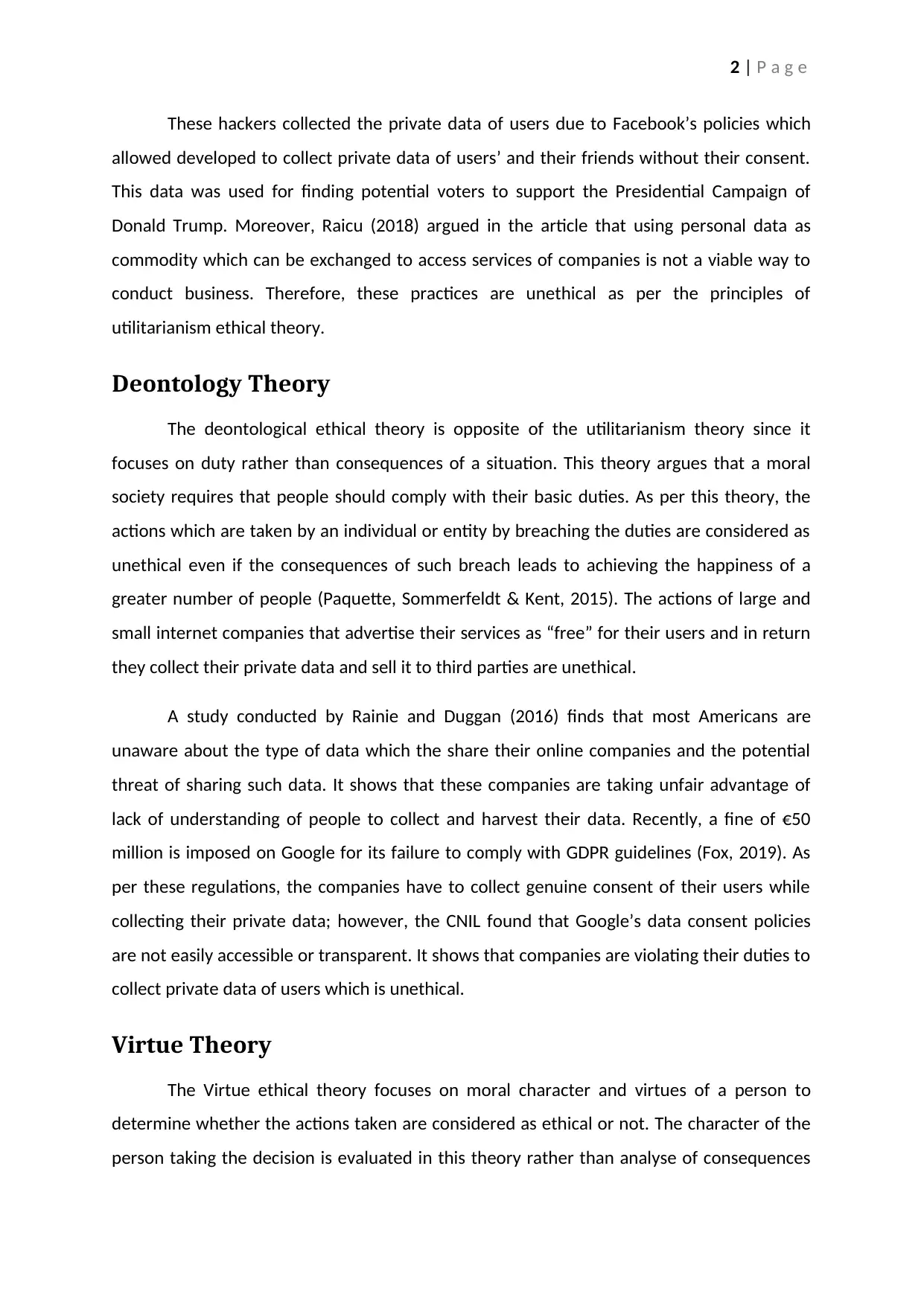
2 | P a g e
These hackers collected the private data of users due to Facebook’s policies which
allowed developed to collect private data of users’ and their friends without their consent.
This data was used for finding potential voters to support the Presidential Campaign of
Donald Trump. Moreover, Raicu (2018) argued in the article that using personal data as
commodity which can be exchanged to access services of companies is not a viable way to
conduct business. Therefore, these practices are unethical as per the principles of
utilitarianism ethical theory.
Deontology Theory
The deontological ethical theory is opposite of the utilitarianism theory since it
focuses on duty rather than consequences of a situation. This theory argues that a moral
society requires that people should comply with their basic duties. As per this theory, the
actions which are taken by an individual or entity by breaching the duties are considered as
unethical even if the consequences of such breach leads to achieving the happiness of a
greater number of people (Paquette, Sommerfeldt & Kent, 2015). The actions of large and
small internet companies that advertise their services as “free” for their users and in return
they collect their private data and sell it to third parties are unethical.
A study conducted by Rainie and Duggan (2016) finds that most Americans are
unaware about the type of data which the share their online companies and the potential
threat of sharing such data. It shows that these companies are taking unfair advantage of
lack of understanding of people to collect and harvest their data. Recently, a fine of €50
million is imposed on Google for its failure to comply with GDPR guidelines (Fox, 2019). As
per these regulations, the companies have to collect genuine consent of their users while
collecting their private data; however, the CNIL found that Google’s data consent policies
are not easily accessible or transparent. It shows that companies are violating their duties to
collect private data of users which is unethical.
Virtue Theory
The Virtue ethical theory focuses on moral character and virtues of a person to
determine whether the actions taken are considered as ethical or not. The character of the
person taking the decision is evaluated in this theory rather than analyse of consequences
These hackers collected the private data of users due to Facebook’s policies which
allowed developed to collect private data of users’ and their friends without their consent.
This data was used for finding potential voters to support the Presidential Campaign of
Donald Trump. Moreover, Raicu (2018) argued in the article that using personal data as
commodity which can be exchanged to access services of companies is not a viable way to
conduct business. Therefore, these practices are unethical as per the principles of
utilitarianism ethical theory.
Deontology Theory
The deontological ethical theory is opposite of the utilitarianism theory since it
focuses on duty rather than consequences of a situation. This theory argues that a moral
society requires that people should comply with their basic duties. As per this theory, the
actions which are taken by an individual or entity by breaching the duties are considered as
unethical even if the consequences of such breach leads to achieving the happiness of a
greater number of people (Paquette, Sommerfeldt & Kent, 2015). The actions of large and
small internet companies that advertise their services as “free” for their users and in return
they collect their private data and sell it to third parties are unethical.
A study conducted by Rainie and Duggan (2016) finds that most Americans are
unaware about the type of data which the share their online companies and the potential
threat of sharing such data. It shows that these companies are taking unfair advantage of
lack of understanding of people to collect and harvest their data. Recently, a fine of €50
million is imposed on Google for its failure to comply with GDPR guidelines (Fox, 2019). As
per these regulations, the companies have to collect genuine consent of their users while
collecting their private data; however, the CNIL found that Google’s data consent policies
are not easily accessible or transparent. It shows that companies are violating their duties to
collect private data of users which is unethical.
Virtue Theory
The Virtue ethical theory focuses on moral character and virtues of a person to
determine whether the actions taken are considered as ethical or not. The character of the
person taking the decision is evaluated in this theory rather than analyse of consequences
⊘ This is a preview!⊘
Do you want full access?
Subscribe today to unlock all pages.

Trusted by 1+ million students worldwide
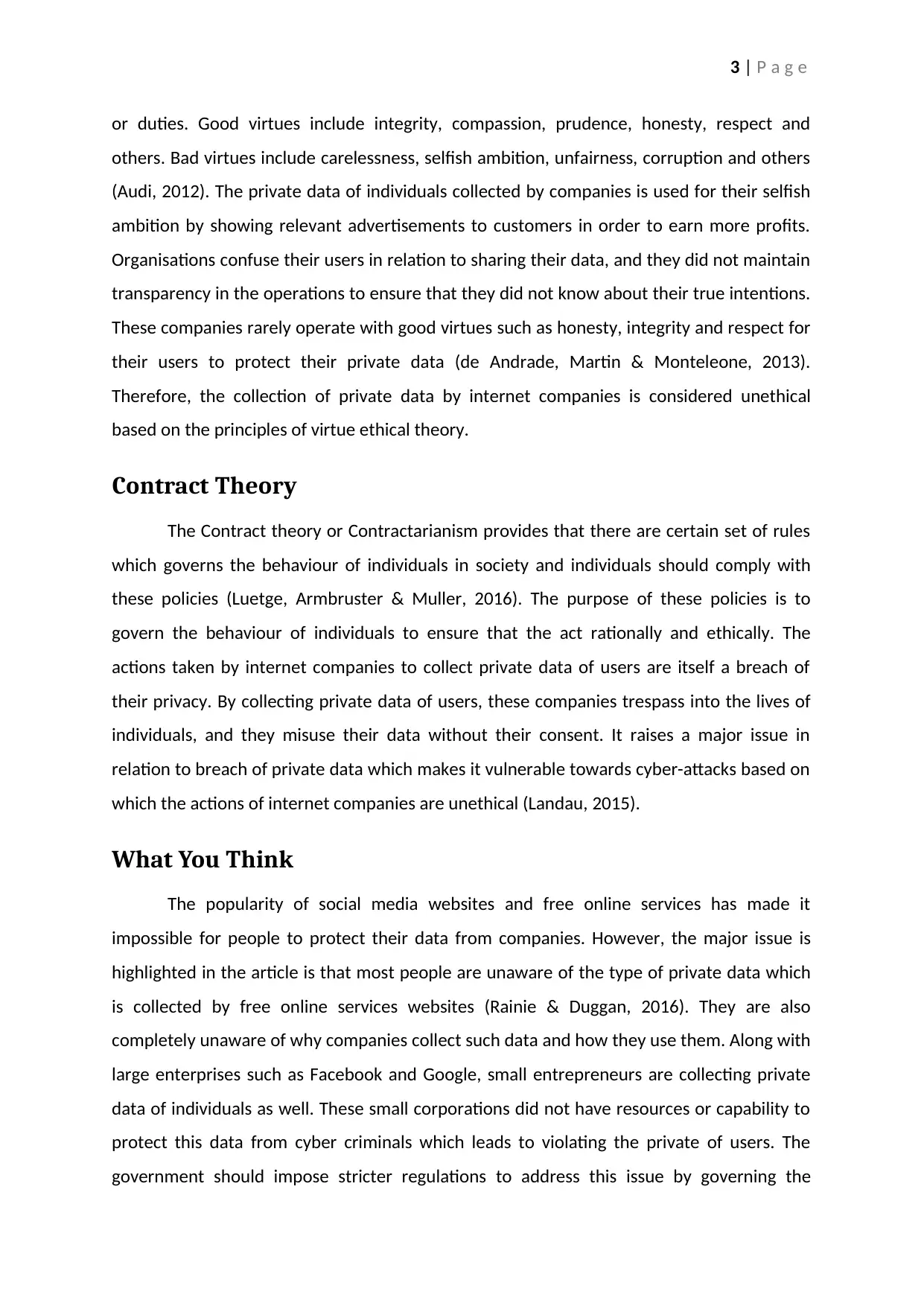
3 | P a g e
or duties. Good virtues include integrity, compassion, prudence, honesty, respect and
others. Bad virtues include carelessness, selfish ambition, unfairness, corruption and others
(Audi, 2012). The private data of individuals collected by companies is used for their selfish
ambition by showing relevant advertisements to customers in order to earn more profits.
Organisations confuse their users in relation to sharing their data, and they did not maintain
transparency in the operations to ensure that they did not know about their true intentions.
These companies rarely operate with good virtues such as honesty, integrity and respect for
their users to protect their private data (de Andrade, Martin & Monteleone, 2013).
Therefore, the collection of private data by internet companies is considered unethical
based on the principles of virtue ethical theory.
Contract Theory
The Contract theory or Contractarianism provides that there are certain set of rules
which governs the behaviour of individuals in society and individuals should comply with
these policies (Luetge, Armbruster & Muller, 2016). The purpose of these policies is to
govern the behaviour of individuals to ensure that the act rationally and ethically. The
actions taken by internet companies to collect private data of users are itself a breach of
their privacy. By collecting private data of users, these companies trespass into the lives of
individuals, and they misuse their data without their consent. It raises a major issue in
relation to breach of private data which makes it vulnerable towards cyber-attacks based on
which the actions of internet companies are unethical (Landau, 2015).
What You Think
The popularity of social media websites and free online services has made it
impossible for people to protect their data from companies. However, the major issue is
highlighted in the article is that most people are unaware of the type of private data which
is collected by free online services websites (Rainie & Duggan, 2016). They are also
completely unaware of why companies collect such data and how they use them. Along with
large enterprises such as Facebook and Google, small entrepreneurs are collecting private
data of individuals as well. These small corporations did not have resources or capability to
protect this data from cyber criminals which leads to violating the private of users. The
government should impose stricter regulations to address this issue by governing the
or duties. Good virtues include integrity, compassion, prudence, honesty, respect and
others. Bad virtues include carelessness, selfish ambition, unfairness, corruption and others
(Audi, 2012). The private data of individuals collected by companies is used for their selfish
ambition by showing relevant advertisements to customers in order to earn more profits.
Organisations confuse their users in relation to sharing their data, and they did not maintain
transparency in the operations to ensure that they did not know about their true intentions.
These companies rarely operate with good virtues such as honesty, integrity and respect for
their users to protect their private data (de Andrade, Martin & Monteleone, 2013).
Therefore, the collection of private data by internet companies is considered unethical
based on the principles of virtue ethical theory.
Contract Theory
The Contract theory or Contractarianism provides that there are certain set of rules
which governs the behaviour of individuals in society and individuals should comply with
these policies (Luetge, Armbruster & Muller, 2016). The purpose of these policies is to
govern the behaviour of individuals to ensure that the act rationally and ethically. The
actions taken by internet companies to collect private data of users are itself a breach of
their privacy. By collecting private data of users, these companies trespass into the lives of
individuals, and they misuse their data without their consent. It raises a major issue in
relation to breach of private data which makes it vulnerable towards cyber-attacks based on
which the actions of internet companies are unethical (Landau, 2015).
What You Think
The popularity of social media websites and free online services has made it
impossible for people to protect their data from companies. However, the major issue is
highlighted in the article is that most people are unaware of the type of private data which
is collected by free online services websites (Rainie & Duggan, 2016). They are also
completely unaware of why companies collect such data and how they use them. Along with
large enterprises such as Facebook and Google, small entrepreneurs are collecting private
data of individuals as well. These small corporations did not have resources or capability to
protect this data from cyber criminals which leads to violating the private of users. The
government should impose stricter regulations to address this issue by governing the
Paraphrase This Document
Need a fresh take? Get an instant paraphrase of this document with our AI Paraphraser
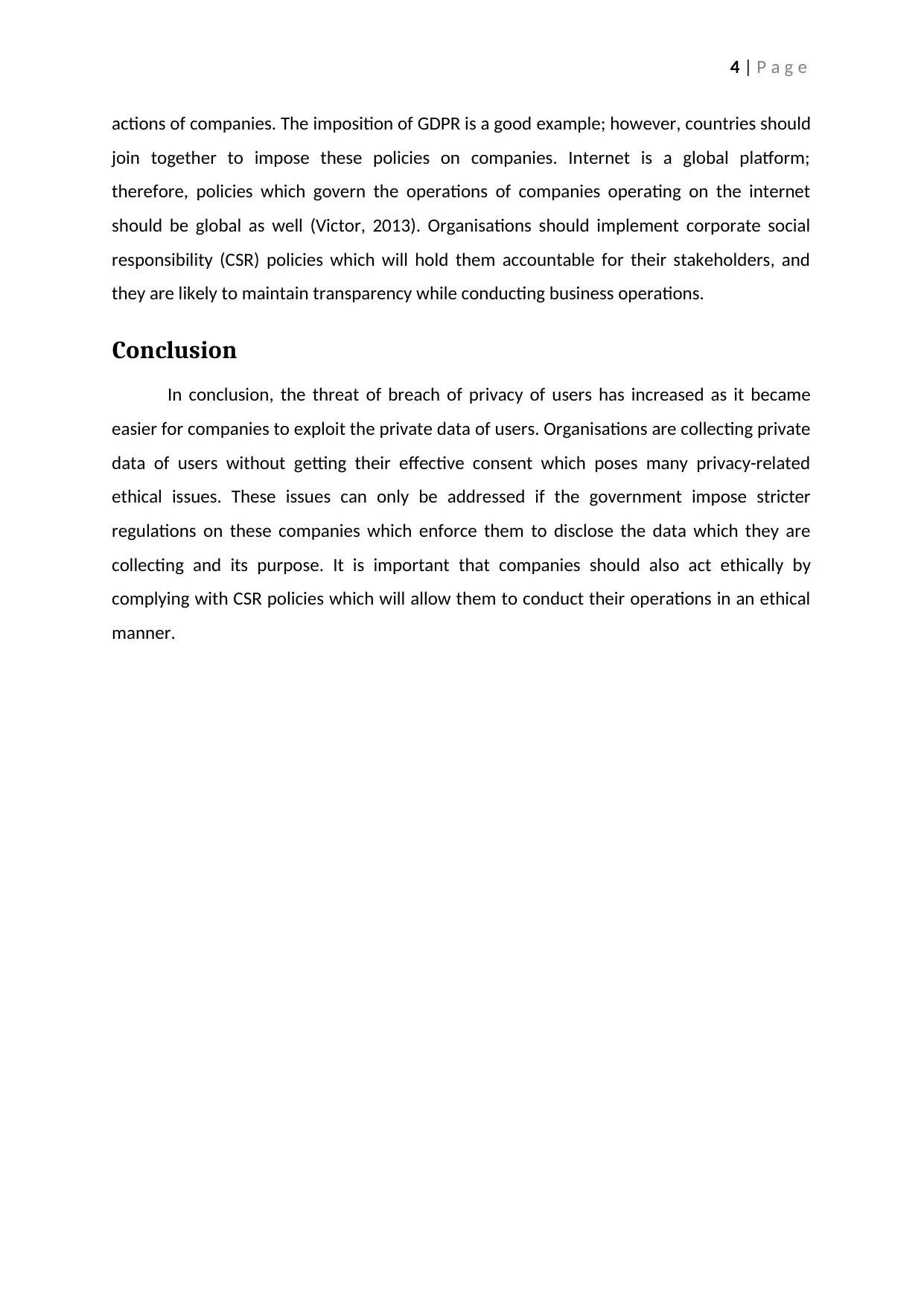
4 | P a g e
actions of companies. The imposition of GDPR is a good example; however, countries should
join together to impose these policies on companies. Internet is a global platform;
therefore, policies which govern the operations of companies operating on the internet
should be global as well (Victor, 2013). Organisations should implement corporate social
responsibility (CSR) policies which will hold them accountable for their stakeholders, and
they are likely to maintain transparency while conducting business operations.
Conclusion
In conclusion, the threat of breach of privacy of users has increased as it became
easier for companies to exploit the private data of users. Organisations are collecting private
data of users without getting their effective consent which poses many privacy-related
ethical issues. These issues can only be addressed if the government impose stricter
regulations on these companies which enforce them to disclose the data which they are
collecting and its purpose. It is important that companies should also act ethically by
complying with CSR policies which will allow them to conduct their operations in an ethical
manner.
actions of companies. The imposition of GDPR is a good example; however, countries should
join together to impose these policies on companies. Internet is a global platform;
therefore, policies which govern the operations of companies operating on the internet
should be global as well (Victor, 2013). Organisations should implement corporate social
responsibility (CSR) policies which will hold them accountable for their stakeholders, and
they are likely to maintain transparency while conducting business operations.
Conclusion
In conclusion, the threat of breach of privacy of users has increased as it became
easier for companies to exploit the private data of users. Organisations are collecting private
data of users without getting their effective consent which poses many privacy-related
ethical issues. These issues can only be addressed if the government impose stricter
regulations on these companies which enforce them to disclose the data which they are
collecting and its purpose. It is important that companies should also act ethically by
complying with CSR policies which will allow them to conduct their operations in an ethical
manner.
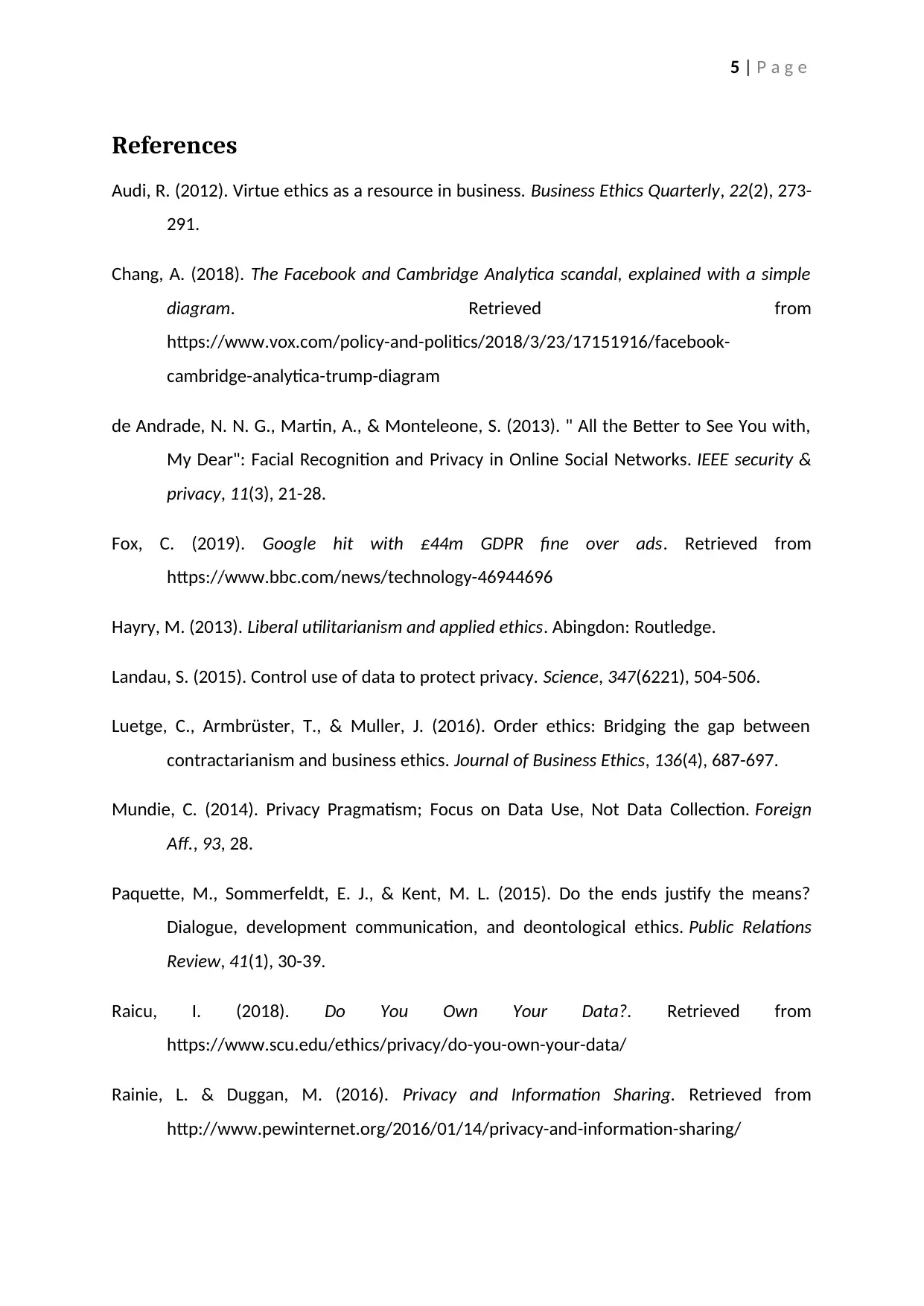
5 | P a g e
References
Audi, R. (2012). Virtue ethics as a resource in business. Business Ethics Quarterly, 22(2), 273-
291.
Chang, A. (2018). The Facebook and Cambridge Analytica scandal, explained with a simple
diagram. Retrieved from
https://www.vox.com/policy-and-politics/2018/3/23/17151916/facebook-
cambridge-analytica-trump-diagram
de Andrade, N. N. G., Martin, A., & Monteleone, S. (2013). " All the Better to See You with,
My Dear": Facial Recognition and Privacy in Online Social Networks. IEEE security &
privacy, 11(3), 21-28.
Fox, C. (2019). Google hit with £44m GDPR fine over ads. Retrieved from
https://www.bbc.com/news/technology-46944696
Hayry, M. (2013). Liberal utilitarianism and applied ethics. Abingdon: Routledge.
Landau, S. (2015). Control use of data to protect privacy. Science, 347(6221), 504-506.
Luetge, C., Armbrüster, T., & Muller, J. (2016). Order ethics: Bridging the gap between
contractarianism and business ethics. Journal of Business Ethics, 136(4), 687-697.
Mundie, C. (2014). Privacy Pragmatism; Focus on Data Use, Not Data Collection. Foreign
Aff., 93, 28.
Paquette, M., Sommerfeldt, E. J., & Kent, M. L. (2015). Do the ends justify the means?
Dialogue, development communication, and deontological ethics. Public Relations
Review, 41(1), 30-39.
Raicu, I. (2018). Do You Own Your Data?. Retrieved from
https://www.scu.edu/ethics/privacy/do-you-own-your-data/
Rainie, L. & Duggan, M. (2016). Privacy and Information Sharing. Retrieved from
http://www.pewinternet.org/2016/01/14/privacy-and-information-sharing/
References
Audi, R. (2012). Virtue ethics as a resource in business. Business Ethics Quarterly, 22(2), 273-
291.
Chang, A. (2018). The Facebook and Cambridge Analytica scandal, explained with a simple
diagram. Retrieved from
https://www.vox.com/policy-and-politics/2018/3/23/17151916/facebook-
cambridge-analytica-trump-diagram
de Andrade, N. N. G., Martin, A., & Monteleone, S. (2013). " All the Better to See You with,
My Dear": Facial Recognition and Privacy in Online Social Networks. IEEE security &
privacy, 11(3), 21-28.
Fox, C. (2019). Google hit with £44m GDPR fine over ads. Retrieved from
https://www.bbc.com/news/technology-46944696
Hayry, M. (2013). Liberal utilitarianism and applied ethics. Abingdon: Routledge.
Landau, S. (2015). Control use of data to protect privacy. Science, 347(6221), 504-506.
Luetge, C., Armbrüster, T., & Muller, J. (2016). Order ethics: Bridging the gap between
contractarianism and business ethics. Journal of Business Ethics, 136(4), 687-697.
Mundie, C. (2014). Privacy Pragmatism; Focus on Data Use, Not Data Collection. Foreign
Aff., 93, 28.
Paquette, M., Sommerfeldt, E. J., & Kent, M. L. (2015). Do the ends justify the means?
Dialogue, development communication, and deontological ethics. Public Relations
Review, 41(1), 30-39.
Raicu, I. (2018). Do You Own Your Data?. Retrieved from
https://www.scu.edu/ethics/privacy/do-you-own-your-data/
Rainie, L. & Duggan, M. (2016). Privacy and Information Sharing. Retrieved from
http://www.pewinternet.org/2016/01/14/privacy-and-information-sharing/
⊘ This is a preview!⊘
Do you want full access?
Subscribe today to unlock all pages.

Trusted by 1+ million students worldwide
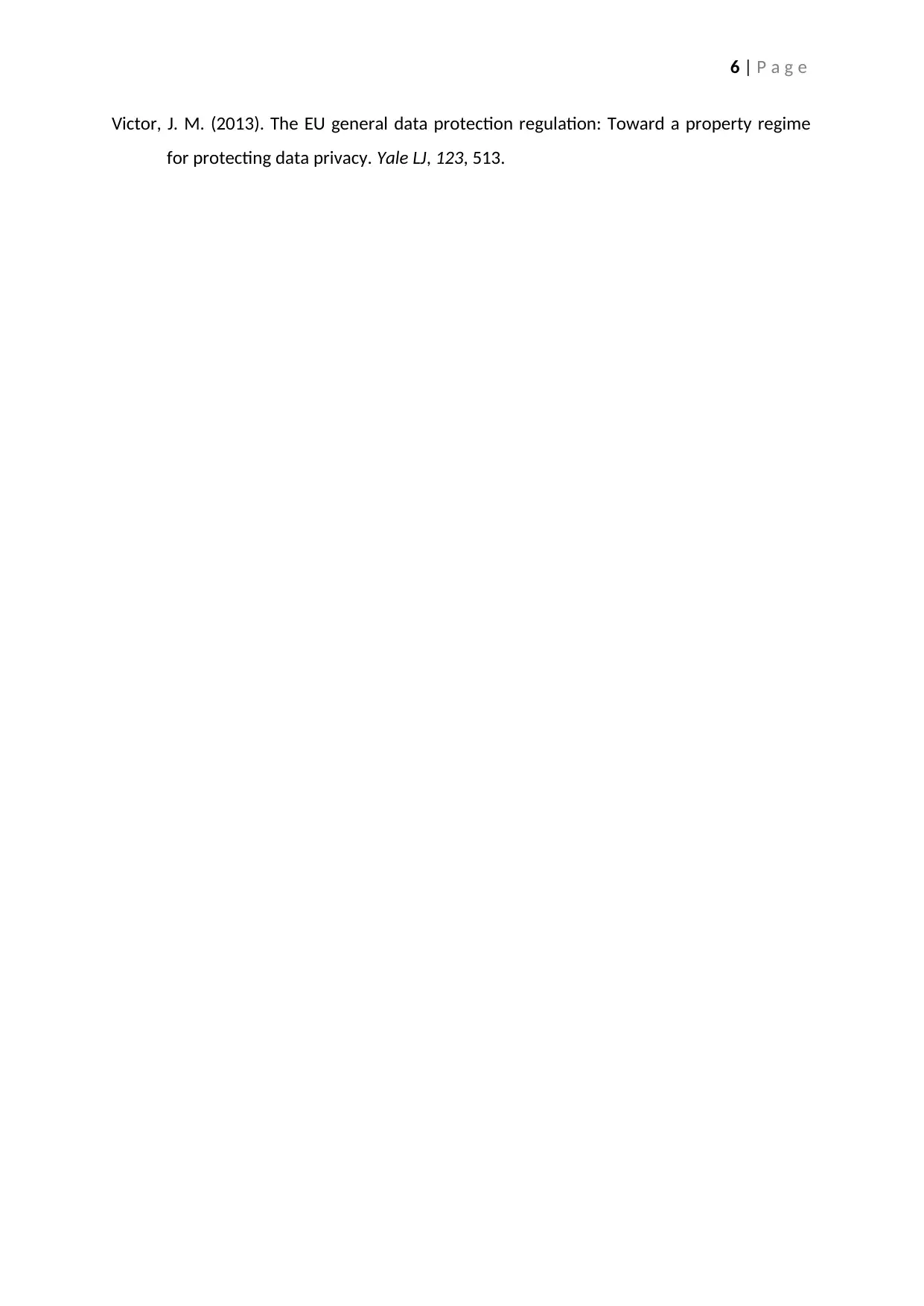
6 | P a g e
Victor, J. M. (2013). The EU general data protection regulation: Toward a property regime
for protecting data privacy. Yale LJ, 123, 513.
Victor, J. M. (2013). The EU general data protection regulation: Toward a property regime
for protecting data privacy. Yale LJ, 123, 513.
1 out of 7
Related Documents
Your All-in-One AI-Powered Toolkit for Academic Success.
+13062052269
info@desklib.com
Available 24*7 on WhatsApp / Email
![[object Object]](/_next/static/media/star-bottom.7253800d.svg)
Unlock your academic potential
Copyright © 2020–2026 A2Z Services. All Rights Reserved. Developed and managed by ZUCOL.




